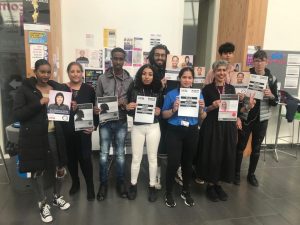
GUCU Branch Meeting – Tuesday 19 March, 1-2pm, RHB 251
- Speakers Sheila Faucher newly elected UNISON Branch Secretary and
- Nicole Sansone GUCU International Rep.
Issues of workload, casualisation, and pay discrimination are significantly worse for BAME, women, gender non-conforming, disabled, migrant, and otherwise precarious colleagues.
In keeping with the recent findings and recommendations of Dr. Nicola Rollock’s report on the professional experiences of black female professors, GUCU is dedicating this branch meeting to better understanding how policy implications and existing business practices impact communities of difference in our shared workplace.
Institutions and unions must commit themselves to supporting the success and centering the concerns of marginalised staff in order to have healthier workplace politics overall.
We will also be voting on the following motion:
Motion: Staying Power
1) Accepts and acknowledges the findings of the report ‘Staying power: the career experiences and strategies of UK Black female Professors’ and resolves to,
2) Act upon the report’s recommendations
Proposed Nicola Rollock, Seconded Marian Carty
MORE INFO:
INEQUALITY IN HE – AN EVERYDAY EXPERIENCE:
- Nicola Rollock’s recent report has found that “Higher education institutions and those bodies which support them need to evidence an explicit and demonstrable engagement with racial justice that extends beyond what is written in policy statements and which serves to radically transform the experiences and success of Black female academics. This requires a fundamental shift in how race and racism are understood. Rather than starting from a de facto position of assumed fairness, institutions must recognise that how they engage and treat Black female academics at each stage of the career trajectory has the potential for unfairness and bias and, in turn, affect their ability to progress successfully to Professorship. That is to say, the under-representation of Black female Professors in higher education must be understood as a failure of the system to support them.”
- Ethnic minorities are more likely to be international staff so receive the double disadvantage of BAME pay gap as well as the burden of fees passed on to international staff specifically (a category that is due to widen in the event of Brexit)
- There already exists a pay gap between UK and non-UK staff
- This inequality is compounded by the fact that Goldsmiths does not have a cohesive and publicly available policy on whether or not it pays for its international staff to legally work in the UK.Tier 2 visas can cost a single individual nearly £1500 for a visa extending over 3 years, with further fees of £610 for every dependent. Most universities in the sector will at minimum reimburse staff for this cost, if not fully pay costs up front.
- The Tier 2 visa costs relative to pay for postdocs can claim up to 34.5% of year 1 pay for an applicant, partner, and two dependents; Tier 2 staff are also ineligible for Child Benefit and Child Tax credits
- One study suggests more part time permanent positions to allow more white and ethnic minority women to enter the workforce; this is a sector-wide observation that isn’t currently available to Goldsmiths as Goldsmiths only currently offers 2 weeks of paid maternity leave, while other universities offer 3 months.
- Casual staff make up a growing part of the university workforce and they play a key role in delivering core content of degree programmes. Over 61% of staff are on insecure contracts at Goldsmiths. As in other sectors, casualised staff are disproportionately women and BME.
